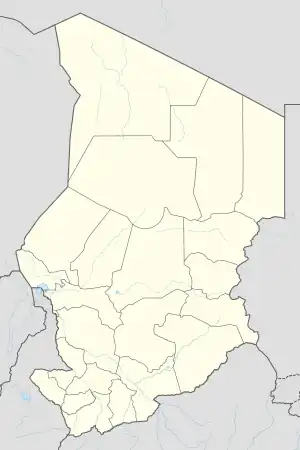| Gweni-Fada crater | |
|---|---|
 Landsat image of the Gweni-Fada crater; screen capture from NASA World Wind | |
| Impact crater/structure | |
| Confidence | Confirmed |
| Diameter | 14 km (8.7 mi) |
| Age | <345 Ma <Early Carboniferous |
| Exposed | Yes |
| Drilled | No |
| Location | |
| Location | Sahara |
| Coordinates | 17°25′7″N 21°45′8″E / 17.41861°N 21.75222°E |
| Country | Chad |
| State | Ennedi-Ouest |
 Location of the crater in Chad | |


Gweni-Fada is a meteorite crater in the Ennedi Plateau, Chad.[1][2]
The Gweni Fada structure was first noted on the map NE 34 X Fada of the IGN (National Geographic Institute France) and aerial photographs in the 1950s of IGN by Alain Beauvilain (Paris X- Nanterre University). In April 1995, at the initiative of CNAR (National Center to Help Research of Chad) a team of French geologists (Pierre Vincent, University of Clermont-Ferrand, Alain and Najia Beauvilain, CNAR Chad) visited the site and reported evidence of shock metamorphism within rock samples they had collected inside the structure.
Centered at 17°25′N and 21°45′E, being slightly wider in the NW-SE direction (cf. topographic map), the asymmetric structure is deeply eroded. A broad depression (ø 12 km) forms a crescent around two thirds of the inner complex zone. On the northern side, an elevated outer ring of outward-dipping sandstones surrounds the depression. In its south, the external depression is absent. The inner zone (ø 10 km) consists of a rugged terrain with hills several hundred meters in height. The latter may be remnants of the central uplift (see topographic map).
The age is estimated to be less than 345 million years (Carboniferous). It is older than that of Aorounga because its coverage of impactite has disappeared as a result of erosion.

See also
References
- ↑ "Gweni-Fada". Earth Impact Database. Planetary and Space Science Centre University of New Brunswick Fredericton. Retrieved 2009-08-13.
- ↑ VINCENT P.M., BEAUVILAIN A., The circular structure of Gweni-Fada, Ennedi : a new meteoritic impact crater in northern Chad. C.R. Acad. Sci. Paris, t. 323, série II a, pp. 987-997, 1996.
Further reading
- Becq-Giraudon, J. -F., Rouzeau, O., Goachet, E. and Solages, S., Meteoritic impact origin of the annular depression of Aorounga, Chad (Africa). C. R. Acad. Sci. Paris, t. 315, série II, p. 83-88. 1992.
- Koeberl, C., African meteorite impact craters: Characteristics and geological importance. Journal of African Earth Sciences, v. 18, pp. 263–295. 1994.
- Koeberl, C., Reimold, W. U., Cooper, G., Cowan, D. and Vincent, P. M., Aorounga and Gweni Fada impact structures, Chad: Remote sensing, petrography, and geochemistry of target rocks. Meteoritics & Planetary Science, 40, No 9/10 P. 1455 - 1471. 2005.
- Koeberl, C., Reimold, W.U., Vincent, P. M., Brandt, D., Aorounga and Gweni Fada Impact Structures, Chad, Central Africa : Petrology and Geochemistry of Target Rocks. LPSC XXIX, Lunar and Planetary Institute, Houston, TX, (CD-ROM). 1998.
- McHone J.F., Greeley, R., More impact and impact-like structures on the SIR-C radar; Europe, Africa, and Arabian Peninsula (abstract). Lunar and Planetary Science XXVIII, pp. 915–916. 1997.
- Miallier, D., Sanzelle, S., Falgueres, C., Fain, J., Pilleyre, Th. And Vincent, P.M., TL and ESR of quartz from the astrobleme of Aorounga (Sahara of Chad), Quaternary Science Reviews, Vol 16 (3-5), pp. 265–274. 1997.
- Ocampo, A. C., Pope, K. O., Shuttle Imaging Radar (SIR-C) Images Reveal Multiple Impact Craters at Aorounga, Northern Chad, 27th Lunar and Planetary Science Conference. 1996.
- Vincent, P. M., Beauvilain, A., Boudeulle, M. and Moutaye, A.H., The astrobleme of Aorounga (Sahara of Tchad): Preliminary structural data (abstract). European Science Foundation, Third International Workshop. Shock Wave Behaviour of Solids in Nature and Experiments, Limoges, France. 1994.

